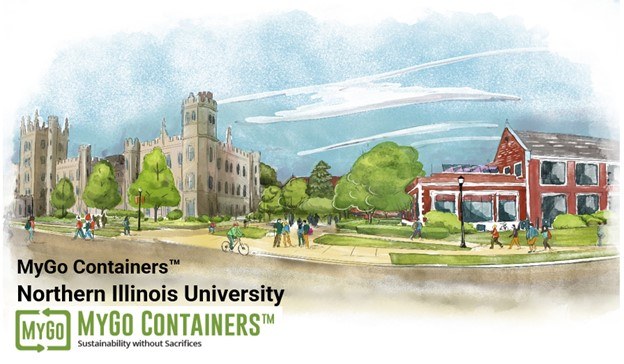Shortly after Dan Papuga took the helm as the Unit Director at Northern Illinois University’s (NIU) Neptune Dining Hall, he was faced with an unprecedented challenge due to the global Covid-19 pandemic. Like countless organizations across the nation, his primary task became finding ways to adapt and continue providing essential services.
Dan, a seasoned professional in the food-service industry with 35 years of experience at a contract company, had joined NIU with the intention of slowing down and enjoying his final years before retirement. However, the pandemic transformed his role drastically. Now, he was responsible for ensuring the safe delivery of three meals a day (and two on weekends) to NIU's on-campus students. Despite being a Division 1 institution with roughly 18,000 students, most lived off-campus or commuted. During regular times, the dining hall served over 2,500 meals daily to approximately 3,500 on-campus students, students with meal plans, and faculty.
Fortunately, NIU had already implemented a carry-out meal service prior to the pandemic, following student requests (though they were using a competitor's container). At that time, only about 10% of meals were taken out. When the pandemic hit, the university had to switch entirely to a carry-out model, and the number of on-campus students dropped by around 80%. This forced Dan and his team to rethink their meal distribution strategies, focusing on getting meals in and out as efficiently as possible.
One of the immediate needs identified was acquiring more durable containers that could keep food warm longer. The previous containers weren't cutting it anymore since students couldn't eat in common areas—they had to return to their dorms or apartments to dine. “When we looked into options, MyGo stood out because it ticked all our boxes,†Dan explained. “The containers needed to have multiple compartments for variety, be sturdier, and retain heat better. MyGo fit the bill perfectly.â€
The transition to MyGo containers went smoothly. NIU began with an initial order of 2,500 MyGo containers, gradually phasing out older models as they deteriorated. By the fall of 2021, Dan anticipates using MyGo containers exclusively.
The initial cost of purchasing MyGo containers was covered by the dining services department, but as more students return to campus, a small annual surcharge of around $5 per student may be introduced to cover the cost of individual containers. Any replacement expenses will be included in the NIU food services budget moving forward.
Currently, MyGo containers are in use at both dining halls operating on campus. Since NIU already had a reusable container program in place, integrating MyGo was seamless. According to Dan, about 90% of the older containers remain in use as they're replaced.
To manage the return of containers, NIU implemented a key fob system. Students receive an initial fob to exchange for a MyGo container and receive a new fob upon returning it. At the start of each semester, students are given a welcome packet containing a key fob, along with salt and pepper shakers, utensils, a reusable straw, and instructions on how to swap out used containers for clean ones.
A significant advantage for busy college students is that they don't need to clean the containers themselves. Initially, many students were diligent about returning clean containers, but over time, fewer returned in pristine condition. Fortunately, the robust polypropylene material ensures that the NIU staff can clean almost any container, regardless of its state. High-temperature dishwashers handle most issues, except for strong odors, breakage, or damage from microwaving.
For Dan’s team, the workload hasn't changed significantly. Cooks and production staff follow the same processes, while front-of-house operations integrate smoothly with the MyGo containers. Service staff appreciates the simplicity of dealing with just one type of container behind the counter. As the campus returns to normal, NIU plans to reintroduce more traditional dining experiences.
The only noticeable change affects the dishwashing staff, as MyGo containers require air drying. To manage this, NIU uses custom drying racks designed specifically for MyGo containers. Given the ample physical space available, managing these racks isn't an issue. The company offers a large rolling rack capable of holding around 60 of the larger rectangular containers, allowing for rotation between batches. “After washing, we place the containers on the racks. We have downtime between meal services, so we ensure they dry completely for at least 30 minutes before stacking them for storage,†Dan explained.
Dan envisions the MyGo program becoming a permanent fixture and potentially expanding beyond its current scope. “It’s cost-effective, reduces waste, and improves efficiency. While it won’t be mandatory once we fully reopen, I believe it will continue to be beneficial even when students dine in again,†he stated.
The convenience of the carry-out program appeals to students, faculty, and staff alike. Students can grab meals between classes and take them with them during short breaks. Faculty members appreciate the flexibility, as they can enjoy meals in their offices or outdoors. They value the variety and affordability but often prefer moments of solitude away from communal dining.
The environmental impact is substantial. NIU has eliminated single-use drinking straws, switched to reusable canvas bags, and provides reusable flatware, with plastic items available only upon request. “When we think about our children and grandchildren, there’s only so much we can afford to throw away,†Dan reflected. “Initiatives like this allow us to make a real difference in reducing landfill waste.â€
View MyGo Containers™ on Cook’s Direct.
We also have a print version here: Northern Illinois University & MyGo Containersâ„¢ Case Study.
Die Casting Motor Parts,Die Cast Metal,Aluminum Die Casting,Die Cast Housing Die Cast Aluminum Suzhou Linmi Precision Machinery Co., Ltd. , https://www.linmicnc.com

Keywords:
Previous Post
Next Post
June 4th, 2021




